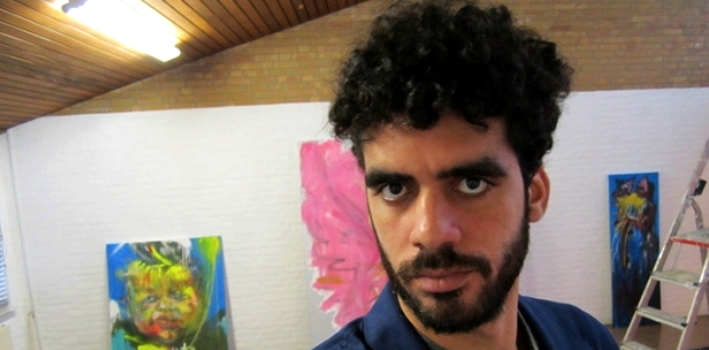
EspañolHis name is Danilo Maldonado Machado. But rather than his name, his signature can be seen on every wall in Havana, and it has become a distinctive symbol for both isolated Cuba and the rest of the connected world: El Sexto.
General Raúl Castro has held the graffiti artist hostage since December 2014, while authorities haven’t charged him with any crime. As his eight-month anniversary of detention in legal limbo nears, his story shows us how miserable the Castro reforms are, as the regime aims to impose a military-style capitalism. The Cuban people were never asked if they agreed with these impositions; in fact, they never chose the Castros as their eternal rulers to begin with.
El Sexto spends his days at the Valle Grande penitentiary — in the outskirts of the capital — for organizing a protest performance he never even got a chance to execute, because State Security [the political police] preemptively detained him, as they usually do.
He planned to name the civic-artistic performance that never happened “Animal Farm, in memoriam.” It consisted of two piglets labeled “Fidel” and “Raúl” in olive green paint — the signature uniform color for the Castroist army and intelligence services. As part of the performance, the pigs would have been allowed to roam around in Havana’s Central Park.
[adrotate group=”8″]
It’s obvious, however, that satraps can’t enjoy satire. Revolution and laughing are unbridgeable opposites. Socialism is dead serious, like a cemetery.
Since he has no way to tell when he will be charged or tried, or at least when he might be able to talk to a lawyer that doesn’t look like a government agent, El Sexto has resorted to self-inflicting harm as his last move to make a case for his innocence. He has launched a hunger strike until there is an official ruling on his case.
In Cuba there are dozens — even hundreds — of jails that look like the worst parts of the US military base in Guantánamo. The difference lies in that the Castro-run Gitmos are state property. Cuban prisoners have witnessed how officials torture inmates for decades, and so far it has been impossible for national and international human-rights watchdogs to independently inspect the prisons.
Countless men have died — whether guilty or innocent and whether jailed for political or for ordinary reasons — killed with bayonets; left to starve while on hunger strike; affected by curable diseases; pushed to suicide and insanity; along with chilling etceteras.
Many Cuban inmates have technically been kidnapped: some have been kept behind bars well beyond having served their sentences, while others remain incarcerated yet uncharged and untried. That is the reason why living in the Cuban “paradise” — a hybrid proletarian and police state — means surviving the never-ending “uncivil” war the state wages against its citizens. And that’s the best definition I can give for our gloomy, tropical totalitarianism.
El Sexto has joined ranks with other Cubans who are punished in an attempt to subdue their spirit of resistance and crush their hopes of living in truth. El Sexto begets hate for his courage; he is scorned because of the unrivaled beauty of his expressions. Because his soul works as a weapon for liberty, this may even stir up feelings of envy.
Among slaves, no one is subject to more belittlement than people with dignity. This is why Cuba looks more like a death row than a military camp. It is a via crucis that has come about with the aid of academic Marxists and social-activist movements from all over the world, both unsupportive of the pro-democracy case in Cuba.
El Sexto described it much better than any Cuban writer ever could, in a clandestine letter written from prison, using syntax brimming with honesty:
Never will evil defeat good. Never will retrograde minds be a match for free minds. Never will violence thwart art and reason. Death will never triumph over life and love. I live joyfully, because I live without fear.
El Sexto has a one-year old baby girl who he hasn’t seen since 2014. This is why, from within his cell, he draws her with angel wings. This is why, behind those cruel bars, he dreams about her: beautiful and free.
El Sexto’s hunger strike is above all, in the name of our future; so that members of new generations won’t need to sacrifice themselves in this tyrannical apartheid, the rotting Cuban dictatorship.
Your support is more important than ever; it’s a matter of life or death. Every passing day is crucial to a jailed individual who refuses to eat.
Your signature for El Sexto represents a signature demanding for a Cuba without the Communist Party gerontocracy kidnapping the future of the nation forever. Your support for anti-establishment art is a voice against the thousands of injustices that so-called 21st-century socialism has brought to our hemisphere.
Let’s stand with El Sexto in this continent-wide struggle: he embodies a cause on the correct side of history, against the usurpers of freedom in Latin America.
 Versión Español
Versión Español












